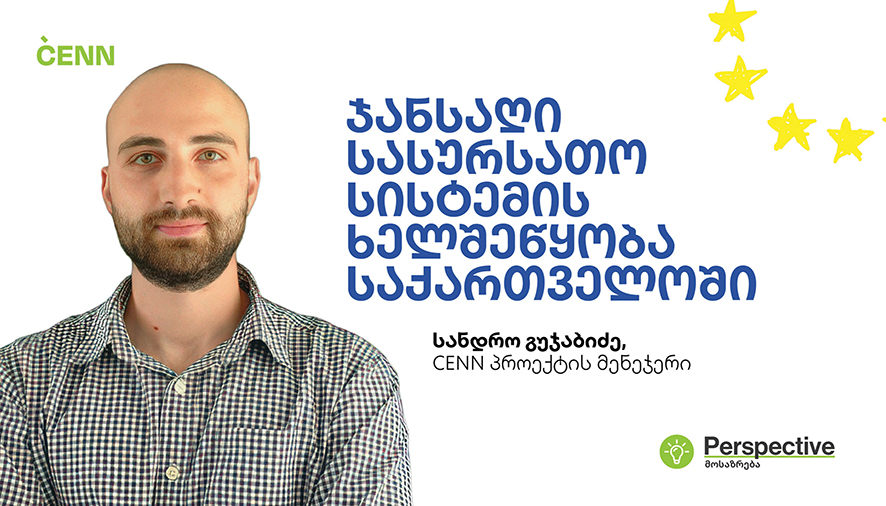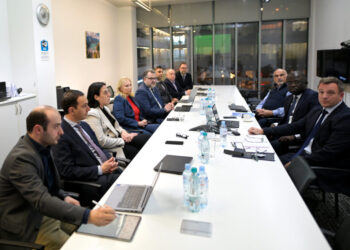Sandro Gujabidze, Project Manager working in the Agricultural and Food Systems area at CENN, shares his vision on the need to actively promote sustainable and climate-resilient agricultural practices in Georgia. He highlights the importance of the project, which includes promoting sustainable soil and water management methods, efficient resource use, and integrated pest management aimed at reducing farmers’ dependence on chemical pesticides.
Agricultural practices implemented in local communities and the approach of Georgian farmers towards them
The European Union is actively promoting the introduction of sustainable and climate-resilient agricultural practices, which simultaneously protect the environment and ensure long-term food security. According to Sandro, one of the most effective approaches of the project is the direct demonstration of practices, which is much more effective than relying solely on theoretical training. In particular, demonstration plots were created within the framework of the project, jointly managed by a women-led agricultural cooperative and a representative of the private sector—the leading agricultural company “Kartlisi”. The diverse vegetables grown on the plots throughout the year confirm the benefits of sustainable practices.
According to Sandro Gujabidze, one of the main factors that increase the effectiveness of demonstration plots is that they belong to local farmers. It is important for farmers to see with their own eyes how a specific practice works in an environment familiar to them. Successful results shown in almost identical conditions increase farmers’ confidence and desire to introduce new practices.
Furthermore, it is important to consider that Georgian farmers often rely on their own land as their main source of income, which limits their ability to test new methods. This is why showing real-world examples on demonstration plots helps overcome initial skepticism among farmers and spreads sustainable agricultural practices.
Developing a healthy food system and sustainable agricultural sector in accordance with EU standards
EU membership will enable Georgia to receive significant support under the Common Agricultural Policy (CAP), which will contribute to the sustainable development of agriculture and the introduction of environmentally friendly practices. Sandro notes that his work reflects the main priorities of the EU’s Common Agricultural Policy (CAP) and contributes to the development of the above-mentioned approaches. Through projects such as PRAISE Marneuli, a more sustainable agricultural sector is being created by introducing and promoting climate-resilient practices.
Sandro identified the development of a climate-resilient agriculture framework document for Marneuli Municipality, which was developed with the involvement of local stakeholders and based on a participatory approach, as one of the project’s significant achievements. The document offers practical recommendations to representatives of the agricultural and farming sector on climate change adaptation and is fully consistent with the goal of the European Union’s Common Agricultural Policy (CAP)—decentralizing sustainability planning and transferring the authority for its implementation to local institutions.
Sandro also noted that the project supports smallholder farmers, including women and ethnic minorities, by strengthening their capacity to implement sustainable practices. Demonstration plots, established in collaboration with local farmers and private sector representatives, provide clear models of sustainable production of annual crops. Such approaches significantly improve and increase safe, nutritious food production, which ultimately contributes to the development of healthy food systems.
In addition, involvement in the project “Achieving Georgia’s National Land Degradation Neutral (LDN) Targets through Restoration and Sustainable Management of Degraded Pastures” contributes to addressing the problems of overuse of pastures and land degradation caused by livestock farming, through balanced feeding practices, pasture rotation, and the restoration of traditional local breeds. This, in turn, ensures the strengthening of agricultural sustainability and environmental protection in line with the objectives of the European Union’s Common Agricultural Policy (CAP).

Sandro noted that EU support will be particularly important during the current transition period, as the impact of climate change is becoming increasingly severe. Agricultural workers in Georgia, especially small farmers, constantly struggle with resource scarcity and increasing risks. Due to the lack of access to appropriate incentive mechanisms and modern approaches, they may be the ones most affected by the negative impacts of the climate crisis. Support based on the principles of the CAP will help farmers improve practices, strengthen sustainability, protect the environment, and move closer to EU agricultural standards.
The project’s success stories demonstrate how EU-supported initiatives have empowered local communities and farmers, promoted the introduction of sustainable practices, and improved the livelihoods of rural populations in Georgia’s agricultural sector.
One of the most important examples of community empowerment and sustainable practices is the PRAISE Marneuli project, implemented by CENN with financial support from HEKS/EPER. The project closely aligns with the EU values of promoting climate resilience, rural development, and community engagement.
Sandro noted that one of the main achievements of Marneuli Municipality is the establishment of a Multisectoral Working Group (MSWG), which brings together representatives of civil society, the private sector, and local authorities, including ethnic minorities and women. Together, the group members identify and seek solutions to important environmental and agricultural challenges—such as the lack of regulation of irrigation systems and climate vulnerability. Their advocacy has led to tangible changes, including the cleaning of important irrigation canals and the activation of citizens in local decision-making processes. Information campaigns in Georgian, Armenian, and Azerbaijani languages have helped the population learn about and protect their rights, which is an important step towards rural empowerment.
Within the framework of the project, the women’s cooperative “Green Eternity” was established, which today already unites 10 local women farmers. Before the project, the production of seedlings was carried out entirely by hand, with limited resources. Through subgrants and technical support, a modern greenhouse was built, an automatic irrigation system was installed, and a sowing machine was purchased.
Agronomists trained members on climate-resistant methods, including the selection of drought- and frost-resistant varieties, rational use of water, and the wise use of pesticides. Today, their production has increased significantly—high-quality seedlings are sold in Marneuli, Tsalka, and Akhalkalaki, as well as in Western Georgia. Income has also increased, the burden of work has decreased, and the members of the cooperative are now sharing their knowledge with other farmers, which in turn creates a chain of positive changes in the local community.
One successful example of the grantor addressing a long-standing problem through the project was when a beneficiary installed a drip irrigation system on his 2-hectare garden with the grant. This investment significantly improved water use efficiency and reduced water consumption by more than 80%, while annual electricity costs decreased from 500-600 GEL to approximately 150 GEL. Similarly, one beneficiary who grows alfalfa doubled his yield after installing a drip irrigation system. At the same time, one beneficiary established a small-scale agricultural machinery service business using a tractor received under the project, which became a stable source of income for him.
What makes these cases particularly valuable is that sustainable agricultural practices were implemented in real-world, farmer-owned settings. This was crucial, as the majority of Georgian farmers lack the resources to take risks or experiment on vital land. When farmers see results in local, real-world settings that are familiar to them, new approaches are most effectively implemented. Over time, the growing interest and adoption of these practices across Marneuli demonstrate that practical and community-based approaches can make a significant contribution to the development of climate-resilient agriculture and the economic empowerment of local communities.
First published by CENN














